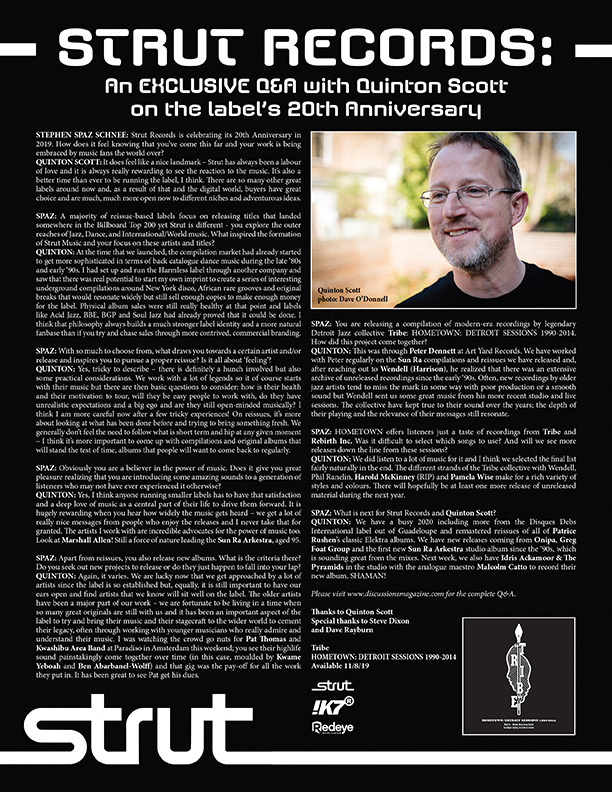STEPHEN SPAZ SCHNEE: Strut
Records is celebrating its 20th Anniversary in 2019. How does it
feel knowing that you’ve come this far and your work is being embraced by music
fans the world over?
QUINTON SCOTT: It does feel like a nice landmark – Strut has always
been a labour of love and it is always really rewarding to see the reaction to
the music. It’s also a better time than ever to be running the label, I think.
There are so many other great labels around now and, as a result of that and
the digital world, buyers have great choice and are much, much more open now to
different niches and adventurous ideas.
SPAZ: A majority of reissue-based labels focus on releasing titles
that landed somewhere in the Billboard Top 200 yet Strut is different – you
explore the outer reaches of Jazz, Dance, and International/World music. What
inspired the formation of Strut Music and your focus on these artists and
titles?
QUNTON: At the time that we launched, the compilation market had
already started to get more sophisticated in terms of back catalogue dance
music during the late ‘80s and early ‘90s. I had set up and run the Harmless
label through another company and saw that there was real potential to start my
own imprint to create a series of interesting underground compilations around
New York disco, African rare grooves and original breaks that would resonate
widely but still sell enough copies to make enough money for the label.
Physical album sales were still really healthy at that point and labels like Acid Jazz, BBE, BGP and Soul Jazz had already proved that it
could be done. I think that philosophy always builds a much stronger label
identity and a more natural fanbase than if you try and chase sales through
more contrived, commercial branding.
SPAZ: How did you settle on the name Strut Records?
QUNTON: The name feels simplistic now compared to some of the newer
labels around today but back in the late ‘90s it felt like a solid, confident
name with obvious ‘70s connotations. I was originally looking at ‘Wah Wah’ but Dom Servini at Wah Wah 45s beat me to it when he launched around the same time!
Love him, though…
SPAZ: With so much to choose from, what draws you towards a certain
artist and/or release and inspires you to pursue a proper reissue? Is it all
about ‘feeling’?
QUNTON: Yes, tricky to describe – there is definitely a hunch
involved but also some practical considerations. We work with a lot of legends
so it of course starts with their music but there are then basic questions to
consider: how is their health and their motivation to tour, will they be easy
people to work with, do they have unrealistic expectations and a big ego and
are they still open-minded musically? I think I am more careful now after a few
tricky experiences! On reissues, it’s more about looking at what has been done
before and trying to bring something fresh. We generally don’t feel the need to
follow what is short term and hip at any given moment – I think it’s more important
to come up with compilations and original albums that will stand the test of
time, albums that people will want to come back to regularly.
SPAZ: Fans of Strut Records may not understand all the issues you
have to deal with in regards to licensing, mastering, and everything else that
you need to do in order to give an album a proper reissue. From the moment you
decide that you want to reissue something to the day it is released, what kind
of time frame are we talking about? And is there a huge relief when the project
is finally released?
QUNTON: It varies a lot. With, for instance, the HAITI
DIRECT album that Hugo Mendez
compiled a few years ago, it was a really long process to track down the
licensors and patiently build their trust before being able to release the
music. It took over two years to get to that point – they questioned the
motives of a UK label coming in to use their music. Then, there were no tapes
at all so we had to track down clean vinyl copies for every track to use as
master sources. Other times, you might have a release which all comes from one
rights owner and can fall together within two or three months. It is always
satisfying to complete an album and it can certainly be a relief if a lot of
money has been spent on a project upfront and if it then takes a long time to
reach the finishing post. Thankfully, there are some patient people at our
parent label, !K7!
SPAZ: Obviously you are a believer in the power of music. Does it
give you great pleasure realizing that you are introducing some amazing sounds
to a generation of listeners who may not have ever experienced it otherwise?
QUNTON: Yes, I think anyone running smaller labels has to have that
satisfaction and a deep love of music as a central part of their life to drive
them forward. It is hugely rewarding when you hear how widely the music gets
heard – we get a lot of really nice messages from people who enjoy the releases
and I never take that for granted. The artists I work with are incredible
advocates for the power of music too. Look at Marshall Allen! Still a force of nature leading the Sun Ra Arkestra, aged 95.
SPAZ: Apart from reissues, you also release new albums. What is the
criteria there? Do you seek out new
projects to release or do they just happen to fall into your lap?
QUNTON: Again, it varies. We are lucky now that we get approached
by a lot of artists since the label is so established but, equally, it is still
important to have our ears open and find artists that we know will sit well on
the label. The older artists have been a major part of our work – we are
fortunate to be living in a time when so many great originals are still with us
and it has been an important aspect of the label to try and bring their music
and their stagecraft to the wider world to cement their legacy, often through
working with younger musicians who really admire and understand their music. I
was watching the crowd go nuts for Pat
Thomas and Kwashibu Area Band at
Paradiso in Amsterdam this weekend; you see their highlife sound painstakingly
come together over time (in this case, moulded by Kwame Yeboah and Ben
Abarbanel-Wolff) and that gig was the pay-off for all the work they put in.
It has been great to see Pat get his dues.
SPAZ: You are releasing a compilation of modern-era recordings by
legendary Detroit Jazz collective Tribe:
HOMETOWN:
DETROIT SESSIONS 1990-2014. How did this project come together?
QUNTON: This was through Peter
Dennett at Art Yard Records. We
have worked with Peter regularly on the Sun
Ra compilations and reissues we have released and, after reaching out to Wendell (Harrison), he realized that there was an extensive archive of
unreleased recordings since the early ‘90s. Often, new recordings by older jazz
artists tend to miss the mark in some way with poor production or a smooth
sound but Wendell sent us some great music from his more recent studio and live
sessions. The collective have kept true to their sound over the years; the
depth of their playing and the relevance of their messages still resonate.
SPAZ: HOMETOWN offers listeners just a taste of recordings from
Tribe and Rebirth Inc. Was it
difficult to select which songs to use? And will we see more releases down the
line from these sessions?
QUNTON: We did listen to a lot of music for it and I think we
selected the final list fairly naturally in the end. The different strands of
the Tribe collective with Wendell, Phil
Ranelin, Harold McKinney (RIP)
and Pamela Wise make for a rich
variety of styles and colours. There will hopefully be at least one more
release of unreleased material during the next year.
SPAZ: What is next for Strut Records and Quinton Scott?
QUNTON: We have a busy 2020 including more from the Disques Debs International label out of
Guadeloupe and remastered reissues of all of Patrice Rushen’s classic Elektra albums. We have new releases
coming from Onipa, Greg Foat Group
and the first new Sun Ra Arkestra
studio album since the ‘90s, which is sounding great from the mixes. Next week,
we also have Idris Ackamoor & The
Pyramids in the studio with the analogue maestro Malcolm Catto to record their new album, SHAMAN!
SPAZ: What are you currently spinning on your CD and/or record
players?
QUNTON: I found a great ‘80s Lonnie
Liston Smith single recently, ‘Never Too Late’. Not a rare one but really
good classic ‘80s boogie. Also, really enjoying Ostinato’s POUR ME A GROG compilation of Funaná
and Only Now’s CAPTIVITY EP on Souk which is unlike anything I have ever heard
before – kuduro down a long dark tunnel!
Thanks to Quinton Scott
Special thanks to Steve Dixon and Dave
Rayburn
TRIBE
HOMETOWN: DETROIT SESSIONS
1990-2014
11.8.19




